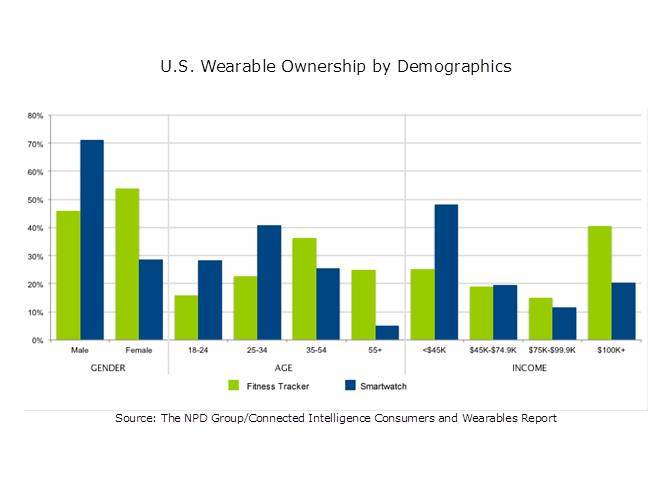Fitness Trackers and Smartwatches Attract Totally Different Groups

Get the world’s most fascinating discoveries delivered straight to your inbox.
You are now subscribed
Your newsletter sign-up was successful
Want to add more newsletters?

Delivered Daily
Daily Newsletter
Sign up for the latest discoveries, groundbreaking research and fascinating breakthroughs that impact you and the wider world direct to your inbox.

Once a week
Life's Little Mysteries
Feed your curiosity with an exclusive mystery every week, solved with science and delivered direct to your inbox before it's seen anywhere else.

Once a week
How It Works
Sign up to our free science & technology newsletter for your weekly fix of fascinating articles, quick quizzes, amazing images, and more

Delivered daily
Space.com Newsletter
Breaking space news, the latest updates on rocket launches, skywatching events and more!

Once a month
Watch This Space
Sign up to our monthly entertainment newsletter to keep up with all our coverage of the latest sci-fi and space movies, tv shows, games and books.

Once a week
Night Sky This Week
Discover this week's must-see night sky events, moon phases, and stunning astrophotos. Sign up for our skywatching newsletter and explore the universe with us!
Join the club
Get full access to premium articles, exclusive features and a growing list of member rewards.
Fitness trackers seem to have gone mainstream — one in 10 adults in the United States now owns a fitness band — but it's much more uncommon for people to own smartwatches, according to a new national survey on consumer trends.
The survey of 5,000 U.S. adults, released Jan. 6, shows that people across the country are buying fitness trackers, which monitor activities such as steps taken, calories burned and time slept. The report found that 36 percent of people who own a fitness tracker are between 35 and 54 years old, 41 percent have an average income of more than $100,000 and 54 percent are women.
In contrast, just 2 percent of people in the U.S. own a smartwatch, and smartwatch owners are younger and less wealthy than fitness tracker wearers, according to the report. Most (69 percent) of people who own a smartwatch are ages 18 to 34, 48 percent earn less than $45,000 yearly and 71 percent are male. [10 Fitness Apps: Which Is Best for Your Personality?]
The reason for the different demographics may have to do with public awareness of different devices, said Wes Henderek, director of Connected Intelligence for the NPD Group, a market research firm.
When fitness trackers first hit stores in early 2013, "fitness fanatics and athletes" bought them in droves, Henderek told Live Science.
"Those people were really disappointed with the products initially," Henderek said. "The stuff that those fitness trackers were tracking was pretty basic, counting things like steps and calories. A lot of them stopped using fitness trackers altogether because it wasn't telling much more than they already knew."
Now, two years later, more companies and improved products have entered the fitness tracker market.With increased awareness and choices, people — even those who only exercise casually — are buying fitness trackers.
Get the world’s most fascinating discoveries delivered straight to your inbox.
"For many people, they're great," said Carol Ewing Garber, a professor of movement sciences and education at Columbia University, who was not involved with the survey. "It gives them a way to really evaluate how much exercise and physical activity they're getting, which is really essential for health."
It's surprising that women make up a slightly bigger share of the fitness tracker market than men, because generally, "women are less active," said Garber, who is also the president of the American College of Sports Medicine. But women also tend to be more aware of their health and weight than men are, and fitness trackers may be a good way for them to monitor their activities, Garber said.
Smartwatches attract an entirely different group of people.
"People buying smartwatches are still early adopters," Henderek said. Most of these adopters are young men who haven't started earning that much money yet. But, like the early fitness trackers, smartwatches are still in the beginning phases of development.
Many smartwatches offer features similar to those of smartphones — they allow people to check email and text messages and go online, Henderek said. But the watches tend to be difficult to use, are uncomfortably large and have a short battery life, he said. Moreover, smartwatches don't offer something unique, meaning they don't have a corner on any market, he said.
Still, many smartwatches also track people's daily activity, and people who buy smartwatches or fitness trackers may be entering a new phase of monitoring their exercise.
"It's exciting to see the interest in these devices," Garber said. "Hopefully, this isn't a case where people are getting the devices and trying them out and then leaving them on their desks because they don't work."
The NPD Group plans to survey people about wearable technology buying habits every six months. Going forward, the survey will also include other wearable technologies, such as eyewear like Google Glass, and smart clothing, Henderek said.
Follow Laura Geggel on Twitter @LauraGeggel. Follow Live Science @livescience, Facebook & Google+. Original article on Live Science.

Laura is the managing editor at Live Science. She also runs the archaeology section and the Life's Little Mysteries series. Her work has appeared in The New York Times, Scholastic, Popular Science and Spectrum, a site on autism research. She has won multiple awards from the Society of Professional Journalists and the Washington Newspaper Publishers Association for her reporting at a weekly newspaper near Seattle. Laura holds a bachelor's degree in English literature and psychology from Washington University in St. Louis and a master's degree in science writing from NYU.
 Live Science Plus
Live Science Plus











